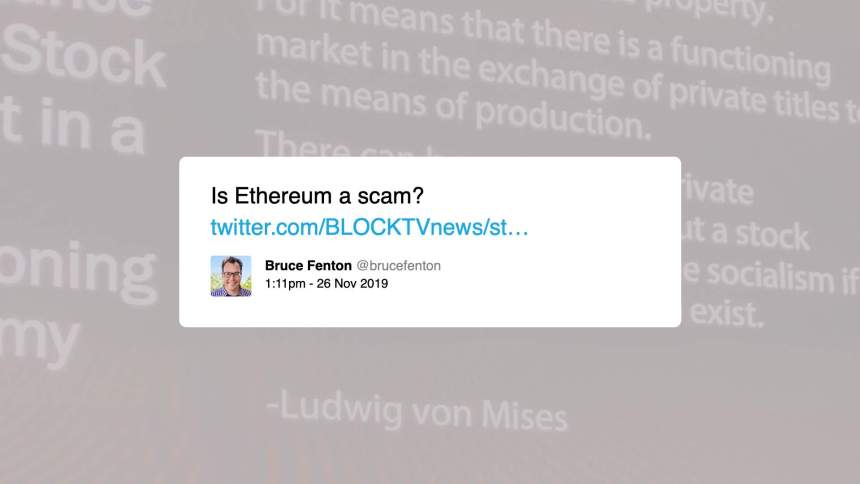The second-largest cryptocurrency Ethereum has been under increased scrutiny as of late, with some asserting that the coin is a scam that hasn’t lived up to its potential.
Bruce Fenton, CEO and Founder, Atlantic Financial, explains in an interview why he believes the coin, despite its struggles, is legitimate and promising. Others in the cryptosphere blame it for the ICO bubble of 2017 and assert that its proof of staking model isn’t viable or tenable.
Is Ethereum a Scam?
Yesterday, November 26, Fenton spoke with BlockTV in defense of Ethereum. He argued that, despite many pointing their fingers at the coin for its role in the 2017 ICO boom that saw many failed projects and disappointed investors, it is not a scam:
“I don’t think it’s a scam. It was honest in the way that it was presented… [and the coin] built this multi-billion dollar ecosystem with hundreds of companies and projects.”
This is noteworthy, considering that more than 80% of ICOs initiated in 2017 were eventually identified as scams, according to a study by Statis Group. The study took into consideration the lifecycle of ICOs run in 2017, from the initial proposal of a sale availability to the most mature phase of trading on a crypto exchange.
Fenton does admit that “some of those projects [were] scams.” But ads, “more commonly a lot of them are weak projects, just bad ideas. And having a bad idea isn’t a crime, in fact it’s part of science. You wanna have things that fail and experiment.”

Criticism of Ethereum
As for the Ethereum blockchain itself, Fenton admits “it hasn’t been perfect.” But argues that as a project, Ethereum is making a best faith effort to deliver what they want and have been transparent from the start.
That goes against statements made by Ethereum co-founder Joseph Lubin — speaking at Ethereal Tel Aviv in September — who acknowledged that the coin in its original form wasn’t built for mass adoption:
“We knew it wasn’t going to be scalable for sure,” Lubin said.
For some, even though the first version wasn’t scalable, they don’t see early marketing claims as misleading, but as an inherent part of the process. This idea is mirrored by Fenton, who told BlockTV:
“We are all in an early stage here in this entire industry. The whole thing is experimental. So we should really have that experimental attitude and embrace experiments and even things that fail sometimes.”
Theranos: “Uncannily Ethereum-Like”
Adam Back, CEO of Blockstream, took to Twitter earlier this week to compare Ethereum’s promises with those of the now-defunct biotech startup Theranos.
“Theranos had several generations of medical testing devices, and pushed their engineers extremely hard. The management just went too far into overselling what it could do and misrepresentation about the state of the tech. Uncannily ethereum-like,” Back said.
Theranos, once headed by the now notorious Elizabeth Homes, was initially praised for its promises to revolutionize the biomedical space with a brand new style of blood sample testing, a process that was ultimately found to be untenable. Holmes, who is facing 20 years in prison, begins her trial July 28, 2020 in a San Jose federal court.
Featured Image from Shutterstock























